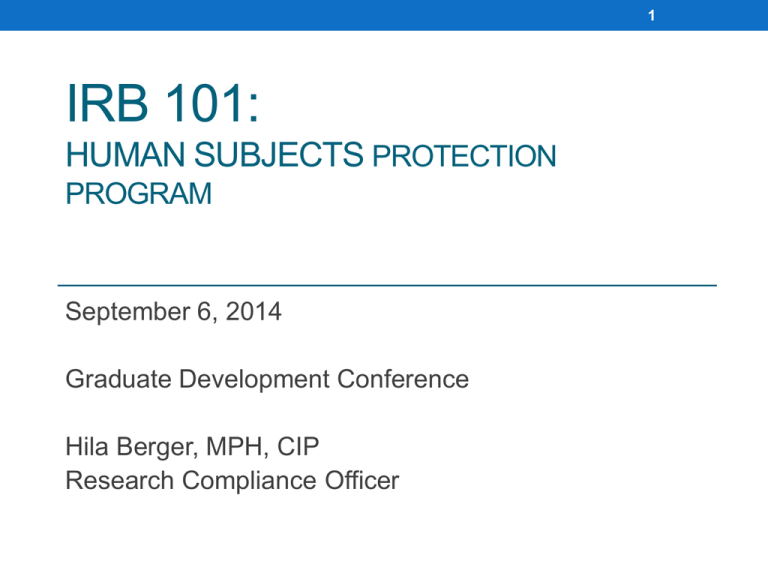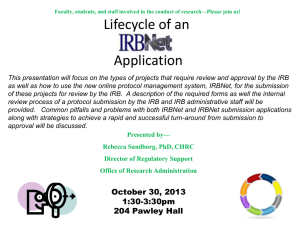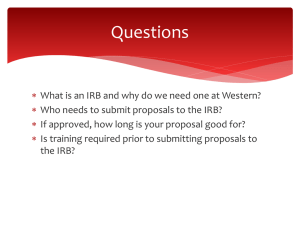IRB Survival Guide - Montclair State University
advertisement

1 IRB 101: HUMAN SUBJECTS PROTECTION PROGRAM September 6, 2014 Graduate Development Conference Hila Berger, MPH, CIP Research Compliance Officer 2 Objectives • What is the IRB responsible for? And why? • What is Human subjects research? • What do we look for when reviewing a protocol? • Document requirements for submission • Approval designations: Full, Expedited, Exempt • IRB 101 TOP TIPS 3 So Why Bother… • Primary objective is to protect human participants • Bound by law (45 CFR Part 46) under our FWA Federal Wide assurance • Thus, we report to U.S. Department of Health & Human Services; Office of Human Research Protection (OHRP) • OHRP will take corrective actions for non-compliance • Including stopping all research projects related or un-related to the study in question IT IS ETHICAL! 4 IRB Mission • to support faculty, staff, students to complete their research in compliance with federal and state laws and MSU policy. As such, the IRB is charged to review, approve initiation of, and conduct periodic reviews of research projects that involve human participants. 5 IRB Committee and Staff • 12 Faculty/1 community members • Amy Krenzer, CIP, IRB coordinator • Mylka Biascochea, IRB Program Assistant • Raja Gounder, IRB Grad Student Assistant 6 Definition of human subjects research • Human subject means a living individual about whom an investigator conducting research obtains (1) data through intervention or interaction with the individual, or (2) identifiable private information • Research is defined as a systematic investigation that is hypothesis driven with the intent to develop knowledge that can be generalized. 9 Human Subjects research (HSR)? • Faculty surveys and interviews students about their experience with her online teaching vs. classroom teaching for self-improvement purposes A - yes HSR B - no HSR C – I don’t know 10 Human Subjects research (HSR)? • MSU Children’s Center conducting surveys after workshops and would like to present program as a model to other Centers on how to provide a particular service to parents. A - yes HSR B - no HSR C – I don’t know • YES Program Evaluation can be HSR too! 11 Not sure if what you are doing is human subjects research? • Submit a Research determination form (RDF) • Available at: http://www.montclair.edu/provost/institutional-reviewboard/forms/ • To reviewboard@mail.montclair.edu • Call or email the IRB for further clarification • IRB Chair or designated member will get back to you within 7 business days to determine if you need to submit an IRB application 12 IRB SUBMISSION PROCESS, REVIEW PROCEDURES AND CATEGORIES 13 OVERALL STEPS in Process Researcher 1.Researcher develops protocol and research plan Student Researcher 1a) Student reviews research protocol with faculty sponsor 2.Researcher completes online Human Subjects training course (CITI) 2a) Student & Faculty Sponsor completes online Human Subjects training course 3.Researcher completes IRB application form 4.Form and attachments submitted to IRB (reviewboard@mail.montclair.edu) 5.Committee / Committee member review and category assignment (timeline anywhere from 3-7 weeks) 6.Decision in writing 3a) Student has Faculty Sponsor review and sign off on completed IRB application form before submitting 15 Application Forms & Templates 16 THE IRB APPLICATION 17 General themes involved in the IRB review (45 CFR 46.111) • how participants are recruited to be in the study • how the privacy of participants will be protected • the physical, psychological, and sociological risks to participants • any discomfort and stress to participants • benefits outweigh the risks • consent process (45 CFR 46.116) • accurately reflect the study • Consent form written in simple lay language • appropriate to the participant pool(language) 18 THE IRB APPLICATION 19 THE IRB APPLICATION 20 THE IRB APPLICATION 21 Checklist: Documents for IRB submission • CITI training completed • Application completed with signatures • Consent form • Translated consent forms if applicable • Site agreements • for any and all off-campus research sites • Recruitment material (flyer, ads, emails, brochures etc.) • Scripts (e.g. in person pleas) • Grant proposal • Data collection instrument (survey, interview questions etc.) 23 Example of requested revisions from a reviewer • Application • #4 - List yourself and all research team members. • #7D - Change response to 'No' since you cannot access SONA • • • • • participant pool (only for Psychology dept.) #16D - Left blank. Even though you may not anticipate an adverse event - you need to verify your understanding of the process for reporting an adverse event or unanticipated problem to the MSU IRB. #17B - MSU IRB policy as stated under #17 "All research data must be maintained for at least four years after the project is closed out or results published whichever occurs last." Please revise your answer. (ALSO correct in #18H) #17J-K - Please revise your process to indicate how you will make use of 3rd party recruiting and data collection in any classes in which you are the professor (also update in question #18 for all steps involved) Consent Form - Please submit, follow the template on our webpage Script and Information Sheet mentions an envelope for results, nothing is indicated in question #18H involving how finished surveys are handed in. 24 How to make changes in Initial Application: • Non-Mac Users • Delete the signature • Make changes • Sign and send • Mac Users – Electronically signing application locks it forever • Always save an unsigned application in latest version • Use unsigned application to make changes on – save again as latest version • Sign and save as another file so it can be sent into IRB 25 Three categories (45 CFR 46.109) • Exempt • (subcategories 1-6) • Expedited • (subcategories 1-9) • Full Board • (subcategories 1-10) 26 Criteria for exempt • Research activities that (1) present no more than minimal risk to human subjects and (2) involve only procedures listed in one or more of the government categories (1-6) • Example: data analysis with de-identified existing data set • Example: regular classroom activity where results are now intended for research • Exempt Review- Goal: 3 to 4 weeks 27 Criteria for expedited • Research activities that (1) present no more than minimal risk to human subjects and (2) involve only procedures listed in one or more of the government categories (1-9) • At MSU • Expedited: Collection of data through non-invasive procedures (e.g., weight) • Expedited: Curriculum program evaluation involving surveys • Most research on individual or group characteristics or behavior (including motivation, identity, social behavior, cultural beliefs) and research using survey, interview, focus group, program evaluation • Expedited Review - Goal: 4 to 6 weeks 28 Criteria for full board • Research activities that present greater than minimal risk to human subjects • Triggers • Any disclosure of illegal activities, sexual attitudes, genetics, religious beliefs, mental health that could place participants at risk of criminal or civil liability, be damaging to the participants financial standing, employability, insurability, reputation, or be stigmatizing • Depression and mental health disorders • Violent crimes • Opinion about employer • • • • • Coercion Deception or incomplete disclosure Population involves persons with cognitive disabilities Pregnant women Medically invasive, e.g., clinical trial • Full Review- Goal: 6 to 8 weeks (involves review of entire committee) 29 IRB Deadlines (all applications are accepted on rolling basis; deadlines will apply for Full Board studies) 31 IRB 101 TOP TIPS TO IRB SUBMISSION 32 IRB 101: TIP #1 Complete submission • Obtain all signatures • Answer every question • Attach your grant proposal and match the title (if applicable) • Use mail.montclair.edu email address for submissions • Fill in Subject Line and Body of Email – next slide 33 Emailing the IRB 34 IRB 101: TIP #2 Clear research design • What will you do? In simple and clear terms • Participant observation • Surveys • Interviews • Intervention • Deception or Incomplete disclosure • Clearly describe your benefits • Do not copy and paste your entire grant proposal, thesis, or manuscript 35 Instrument Design for Online Surveys • MSU IRB does not require use of one survey tool • Survey tools • MSU survey https://surveys.montclair.edu/survey/login.jsp?r=1 • Only one screen; difficult to consent unless you create 2 surveys • MSU limesurvey https://msusurveys.montclair.edu/admin/admin.php • Data stored in-house; similar features to survey monkey • Other survey tools: • http://idealware.org/articles/fgt_online_surveys.php • For consent use the template for implied consent for online surveys 36 IRB 101: TIP #3 Proper Informed consent • Understand Consent vs. Assent • Assent form with Parent/Guardian Consent if research is with minors • Template available online only to be used as outline • The consent should clearly and succinctly tell people what your study is about; including any screening procedures • Readability level • Adults – 6th-8th grade reading level for general public • Ask for help! 37 CONSENT Example… explaining the study Poor This survey is about cervical cancer and screening - Screening what? - Cervical cancer risk? - Cervical cancer symptoms? Better This survey will ask you questions about perception of cervical cancer risk and screening behaviors of college aged female students. I hope to learn about what young women know about cervical cancer and risk factors, how they perceive risk, and how that effects whether or not they have been screened for cervical cancer. 40 IRB 101: TIP #4 Be consistent • Confidential vs. anonymous • Only anonymous if researcher and others cannot identify the participant (i.e. online survey) • Participation time should be the same in application and in your consent form • Use of data in the future • If you ask for permission to use data in future studies then include this on the consent • Compensation • Compensation noted in the application should be noted in the consent form 41 IRB 101: TIP #5 Data security, privacy, and storage • What identifiers are you keeping? • Limit identifiers (DOB vs. age range) • Plan for confidentiality • Disclose any limits to privacy or confidentiality if you are collecting online or electronically • Data retention • Policy is for 4 years after project completion 42 Questions to ask yourself about Data? • Am I collecting or retaining any identifiable data beyond • • • • • what is absolutely necessary for the study? Have I planned for how I will destroy identifiable data and described in app? Have a used a code and planned for how I will keep the key to identifiers separate? Do I routinely review and update my data security? If my data is particularly high risk have I consulted security experts? Will I be traveling with my data and have I planned for a safe backup? 43 Data Transmission • Email is not secure • No built-in encryption • Hard to delete from email (email servicer keeps a copy) • Alternatives • Internal MSU fileHAWK • External transfers systems that offer encryption 44 Data Security and Storage • Data Storage • The data will be stored on a partitioned, password protected subdirectory on a password protected work stations, stored in a locked office on the campus of Montclair State University. Any working files, output generated from these data, and drafts of related presentations/articles will also be kept in the same manner as described above • Internet Data collection • Data will be collected using the Internet; no guarantees can be made regarding the interception of data sent via the Internet by any third party (i.e. your employer). Confidentiality will be maintained to the degree permitted by the technology used. 45 IRB 101: TIP #6 Inclusion of risks to participants • No study is without risk • Risks examples are: • Emotional Distress • Loss of social status among peers or other students • Psychological distress • Invasion of privacy • Loss of employment • Embarrassment • Risks may vary with vulnerable populations • Children, Pregnant Women, Teens, Prisoners, Cognitively Disabled, minorities/ethnic groups 46 IRB 101: TIP #7 Dealing with risk and disclosure • Questions that include mental health status or violent attacks should refer to • Counseling and Psychological Services (CAPS) • Other counseling services • Questions that include health and well-being should refer to: • Health Care Provider • Therapist • International Research • International standards and regulations are considered as part of the MSU IRB review. • Ethics review at the international site may or may not be required. 47 IRB 101: TIP #7a Dealing with risk and disclosure - examples The risks are no greater than those you might encounter in everyday college life. If you feel uncomfortable or wish to stop the interview at any time, please let me know and we will stop the interview. There is a slight possibility that you may feel like you just shared something you didn’t want to share within the group session. We will encourage everyone to tell a member of the research team if he or she feels at all uncomfortable at any point during this study. 48 IRB 101: TIP #7a dealing with risk and disclosure - examples While you are in this study, you may feel upset about something we ask you. If something that you talk about makes you feel upset, we will give you the name of someone who can help you. You may be worried that something you say will not be kept private. We use a code number for each person in the study. We never use your name. The interviewer will never give any personal information about you to anyone. The only time the interviewer would tell anyone about you, is if you or your baby were in danger. That means things like child abuse or sexual abuse. When we talk about the study, we will ONLY talk about the entire group of girls and babies in this study. No one, except your social worker or the person who gives you the services will know that you are in the study. * courtesy of Dr. Lisa Lieberman During this interview, we will ask you some questions about your age, who you live with, whether you are married or single, if you use drugs, if you have HIV and if you have any other medical problems. We will note down your answer to these questions. Your answers could be risky outside of this research because it could get you arrested, or you could lose your job, or your reputation. But, we will make every effort to make sure that your information is kept private. We will conduct the interview in a private room at _____. We will never share your personal information with anyone outside of the research. If any of the questions make you uncomfortable, with your permission, we will refer you to your counselor or case manager who can assist you. *courtesy of Dr. Meena Mahadevan 50 IRB 101: TIP #8 Ask for Help • Email us your questions • Call our offices • Drop-ins welcome M-F 8:30-4:30 • College Hall 248 • Visit our FAQs 52 My Application was approved: what now? • Use the stamped consent form(s) and other documents • • • • • for your study participants (everyone gets a CF copy) Report any adverse events to the IRB within 72 hours Apply for an amendment approval if you plan to change your research protocol Add research team members using the IRB amendment application to add/change personnel Don’t let your approval expire! Once your study is complete and you are done with data analysis submit a project completion form 53 IRB/Compliance contact information • IRB Coordinator: Amy Krenzer • reviewboard@mail.montclair.edu • Ext. 7583 • IRB Program Assistant: Mylka Biascochea • biascocheam@mail.montclair.edu • Ext. 3021 • Research Compliance Officer: Hila Berger • bergerh@mail.montclair.edu • Ext. 7781 • IRB Chair: Dr. Katrina Bulkley • Ext. 5189 • IRB Office: College Hall 248







